UK Energy
- UK’s smart meter targets leaving energy users short-changed, says Martin Lewiswww.theguardian.com UK’s smart meter targets leaving energy users short-changed, says Martin Lewis
Consumer campaigner writes to Ed Miliband warning that installations are being prioritised over repairs

> Energy customers are being short-changed by “perverse” government targets to install electronic smart meters in homes across the UK, according to the consumer campaigner Martin Lewis. > >Lewis, the founder and chair of MoneySavingExpert.com (MSE), has written to Ed Miliband, the secretary of state for energy security and net zero, warning that installations are being prioritised over repairs, leaving thousands of households facing shock bills because their meters have malfunctioned. > > Last December, the artist Grayson Perry reported that his monthly electricity charge had soared from £300 to £39,000 because of a faulty smart meter. Lewis wants suppliers to be incentivised to fix faulty meters as well as installing new ones. > >“I am writing to you […] to warn of the brand damage that risks making the government’s targets framework perverse,” Lewis said in his letter. “A rethink is needed – specifically I’d suggest shifting firms’ targets from smart meter installations to the overall number of ‘working’ smart meters, which would incentivise firms to do both installations and repairs.”
- UK government to buy electricity system operator from National Grid for £630mwww.theguardian.com UK government to buy electricity system operator from National Grid for £630m
New operator, Neso, will also oversee Great Britain’s gas system as part of ‘clean energy superpower’ mission
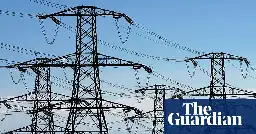
> The UK government has agreed to take control of the National Grid unit tasked with keeping the lights on in a £630m deal that takes effect from next month.
> Great Britain’s electricity system operator (ESO) will be transferred into public ownership to create a new national energy system operator (Neso), which will also oversee the gas system.
> The government hopes that by bringing together the separate units involved in planning Great Britain’s electricity and gas networks under one publicly owned company, the system operator can adopt a more strategic approach to achieving a net zero energy system by 2030.
[...]
> The decision to remove the ESO from National Grid’s ownership was made under the previous Conservative government because of concerns over a conflict of interest relating to the operator’s role providing strategic advice to government officials. The deal was expected to take place in July this year but it was delayed until 1 October because of the general election.
So this was going to happen anyway?
- High court blocks Cumbria plan for UK’s first new deep coalmine in 30 yearswww.theguardian.com High court blocks Cumbria plan for UK’s first new deep coalmine in 30 years
Court rules against West Cumbria Mining’s fossil fuel development in Whitehaven

> The UK’s first new deep coalmine in 30 years will not be allowed to go ahead after a ruling in the high court. > >On Friday morning, Justice Holgate ruled that plans to build the facility in Whitehaven, Cumbria, would not proceed, in what campaigners called a “victory for the environment”. > > New fossil fuel projects are thought to be on shakier legal ground after the precedent set by a landmark supreme court decision that quashed planning permission granted for an oil drilling well at Horse Hill on the Weald in Surrey. The judgment found the climate impact of burning coal, oil and gas must be taken into account when deciding whether to approve projects. This was the first court decision on plans for a new fossil fuel development since the Horse Hill ruling. > >Holgate agreed with Friends of the Earth that Michael Gove, when he was secretary of state for levelling up, acted unlawfully in accepting a claim by West Cumbria Mining (WCM) that the mine would be “net zero” and have no impact on the country’s ability to meet the emissions cuts required under the Climate Change Act 2008, because it was relying on offsetting through purchasing carbon credits from abroad. UK government policy does not allow for reliance on international offsets to meet carbon budgets. > >The new Labour government this year withdrew its support from the Whitehaven mine in the Cumbria legal case. Lawyers acting for Angela Rayner, the secretary of state for housing, communities and local government, said there had been an “error in law” in the decision to grant planning permission for the mine in December 2022.
- 'Monstrosity' substation in Runcorn gets planning approvalwww.bbc.com 'Monstrosity' substation in Runcorn gets planning approval
Councillors narrowly approve the plan for an electricity substation which one said was a "monstrosity".

> Councillors have narrowly approved the construction of an electricity substation which one described as a "monstrosity". > >The substation in Runcorn, Cheshire, has been designed to provide power to about 850 homes on the Sandymoor South and Wharford Farm estates being built by government agency Homes England. > >The agency’s application had been previously criticised with local politicians citing concerns that the substation would impose on existing homes in the area. > > ... > > The developments attached to the substation are part of a wider scheme, which has seen about 1,500 homes either built or proposed. > >However, the structure itself will stand in neighbouring Norton, close to existing homes that will not be powered by it, and lead to the loss of green space and trees. > > ... > > Other councillors expressed concerns over the choice of site, which was designated as green space in the authority’s delivery and allocations local plan, a blueprint which sets out the borough’s planning policy up to 2037.
- Nine offshore wind farm projects awarded in UK auctionwww.bbc.co.uk Nine offshore wind farm projects awarded in UK auction
The green energy deals follow last year's auction when no companies bid to build offshore wind farms.

> A total of nine offshore wind farm contracts have been awarded by the government after last year's auction failed to attract any bidders at all. > >The contracts are part of a wider slate of green energy projects that also include tidal and solar power, and will provide enough electricity to fuel the equivalent of 11 million UK homes, the government said. > >However, while the new offshore wind projects have been broadly welcomed, some experts questioned whether they would generate enough capacity to meet renewable energy targets set for 2030. > > ... > > On Tuesday, a total of 131 contracts have been awarded to firms for projects which will generate 9.6 gigawatts (GWs) of renewable energy. > >The new offshore projects include what will be Europe's largest and second-largest wind farms, Hornsea 3 and Hornsea 4, which will be built off the Yorkshire coast by Ørsted, the Danish energy giant that is majority-owned by the state. > > The Labour government is aiming to produce 60GW of energy through offshore wind farms by 2030. > >The offshore wind farm projects announced on Tuesday provide capacity of 4.9GW. > >Pranav Menon, a research associate at Aurora Energy Research, said the government still has some way to go to meet its goal. > >"It still falls short of the pace required to meet its ambitious targets," he said.
- UK Government will not fight Rosebank North Sea oil field legal challengewww.dailyrecord.co.uk UK Government will not fight Rosebank North Sea oil field legal challenge
Environmental groups Greenpeace and Uplift had brought legal claims to stop drilling in the untapped oil sites of Rosebank and Jackdaw.

> The UK Government will not fight a legal challenge against plans to develop two North Sea oil fields. > > Environmental groups Greenpeace and Uplift had brought legal claims to stop drilling in the untapped oil sites of Rosebank and Jackdaw. > > It comes after the Supreme Court ruled that the environmental impact of new oil fields should be considered when granting licences. > > The Government said its decision not to fight the challenge will "save the taxpayer money". > > Rosebank is 80 miles to the west of Shetland and contains around 300 million barrels of oil, making it the UK's last major undeveloped oil site. Jackdaw is 150 miles east of Aberdeen. > >The licences for the two fields have not been withdrawn. Energy giants Shell and Equinor - who are the developers hoping to drill at the sites - can still fight the challenge.
- Kent: Council rejects solar farm plan branded 'insane'www.bbc.com Kent: Council rejects solar farm plan branded 'insane'
Supporters say the installation near Sittingbourne would have powered 11,500 homes.

> Plans to build a solar farm the size of 86 football fields in Kent have been rejected as "insane". > >Developers of the installation on "high-grade" farmland near Sittingbourne were told by a councillor the panels should instead be placed on roofs and car parks. > >Supporters pointed out the site - sitting either side of Vigo Lane and Wrens Road near Borden - would have provided clean energy for 11,500 homes. > >Developers Industria Solar said they were "disappointed" by the decision, but would review their application and consider "further steps". > > ... > > Building the sprawling solar farm near the boundary of the Kent Downs National Landscape was criticised by Green Party councillor Terry Thompson, who pointed out it took up Grade 1 farmland. > >As a farmer, he said it was "insane" to build on such fertile land, reported the Local Democracy Reporting Service. > >“It isn’t an industrial landscape, it’s the garden of England.” > >“We really seriously need to think about security of food production," he added.
- Electrical 'superhighway' between Scotland and England approvedwww.bbc.co.uk Electrical 'superhighway' between Scotland and England approved
The multi-billion link will allow Scottish renewable energy to be sent to consumers down south
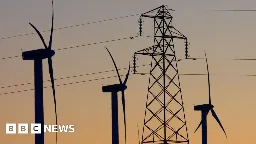
- Biomass power station produced four times emissions of UK coal plant, says reportwww.theguardian.com Biomass power station produced four times emissions of UK coal plant, says report
Drax received £22bn in subsidies despite being UK’s largest emitter in 2023, though company rejects ‘flawed’ research

> The Drax power station was responsible for four times more carbon emissions than the UK’s last remaining coal-fired plant last year, despite taking more than £0.5bn in clean-energy subsidies in 2023, according to a report. > >The North Yorkshire power plant, which burns wood pellets imported from North America to generate electricity, was revealed as Britain’s single largest carbon emitter in 2023 by a report from the climate thinktank Ember. > >The figures show that Drax, which has received billions in subsidies since it began switching from coal to biomass in 2012, was responsible for 11.5m tonnes of CO2 last year, or nearly 3% of the UK’s total carbon emissions. > > Drax produced four times more carbon dioxide than the UK’s last remaining coal-fired power station at Ratcliffe-on-Soar in Nottinghamshire, which is due to close in September. Drax also produced more emissions last year than the next four most polluting power plants in the UK combined, according to the report. > > Frankie Mayo, an analyst at Ember, said: “Burning wood pellets can be as bad for the environment as coal; supporting biomass with subsidies is a costly mistake.” > >The company has claimed almost £7bn from British energy bills to support its biomass generation since 2012, even though burning wood pellets for power generation releases more emissions for each unit of electricity generated than burning gas or coal, according to Ember and many scientists. In 2023, the period covered by the Ember report, it received £539m. > > ... > > The government’s own spending watchdog, the National Audit Office, has warned that ministers have handed a total of £22bn in billpayer-backed subsidies to burn wood for electricity despite being unable to prove the industry meets sustainability standards. > > Mayo said: “Burning wood for power is an expensive risk that limits UK energy independence and has no place in the journey to net zero. True energy security comes from homegrown wind and solar, a healthy grid and robust planning for how to make the power system flexible and efficient.” > >The FTSE 100 owner of the Drax power plant made profits of £500m over the first half of this year, helped by biomass subsidies of almost £400m over this period. It handed its shareholders a windfall of £300m for the first half of the year.
- 'Ultra-cheap energy for every household': could a different kind of tariff change everything?www.theguardian.com ‘Ultra-cheap energy for every household’: could a different kind of tariff change everything?
Rising block tariffs and national energy guarantee systems are almost unknown in Europe – but are flourishing elsewhere

> More than half of the world’s population lives under an energy system that its advocates say can tackle fuel poverty, improve crumbling housing stock and reduce energy demand. And to cap it off – when properly designed – it would not cost the taxpayer anything.
> The so-called rising block tariff or national energy guarantee system (NEG) are almost unknown in Europe but operate successfully in many other countries and regions – from Japan, South Korea and China to Bangladesh, India and California.
- ‘There’ll be no countryside left’: Opposition to pylons puts UK carbon targets at riskwww.theguardian.com ‘There’ll be no countryside left’: Opposition to pylons puts UK carbon targets at risk
Infrastructure essential to decarbonise electricity generation by 2030 met with resistance by those affected

> Tucked away beyond the industrial landscapes of north-east Derbyshire and the M1 corridor, the Amber Valley is an oasis of greenery: ancient trees, listed buildings and public footpaths that are increasingly popular with tourists. > >But Katie Hirst, a local resident, fears that appreciative visitors will vanish along with the unspoilt landscape if a route of 50-metre-high pylons is brought down the valley as National Grid intends. > > “People come here for wonderful walks and the unspoilt landscape, and that would be gone, and the economy would really suffer,” said Hirst, a co-founder of Save Amber Valley Environment (Save), one of a growing number of grassroots groups opposed to pylon schemes across the country. > > ... > > More than 600,000km of power lines will have to be unrolled across the UK over the next few years for the country to properly decarbonise. But the pylons and the renewable infrastructure that will carry them are already causing anxiety and resistance. > > There were forceful statements from Keir Starmer last week, saying he would take the “tough decisions” necessary to get pylons built. The next day Ed Miliband was a little more emollient, promising to consider benefits for communities affected by the construction of renewable energy infrastructure, and community ownership of the assets, which could include onshore windfarms and solar farms. > >So how is this going to work? For the government to meet the ambitious target of decarbonising electricity generation by 2030, new infrastructure – including wind turbines, on and offshore; solar farms; and new transmission systems such as pylons – will be essential. > >But the other parliamentary parties either oppose pylons, or allow MPs in certain constituencies to oppose them. Local groups in some areas are also organising. > > ... > > The Labour party says it can meet its ambition of being a “clean energy superpower” only by building the new infrastructure necessary. The decarbonising electricity target is likely to require a doubling of onshore wind capacity, a quadrupling of offshore wind and a tripling of solar power by 2030. This will require what transmission companies have described as a “colossal” investment in power grid upgrades, which will cost billions of pounds and is likely to make the country’s electricity infrastructure more visible than ever before. > > The UK will need to install five times as many pylons and underground lines in the six years to 2030 as it has in the past 30 years – and four times more undersea cables than there are now, according to estimates from National Grid. Existing pylons and ageing cables will also need to be replaced. More than 600,000km of lines will need to be added or replaced by 2040 based on the age of existing transmission and distribution lines, the rollout of renewables and growing electricity demand, according to data from the International Energy Agency. This means cables will need to be rolled out at a pace of almost 100km every day for 17 years.
- UK Labour tries to attract clean energy contracts with record £1.5bn for auction | The new budget comes after the previous government failed to award a single new offshore wind contract in 2023www.theguardian.com Labour tries to attract clean energy contracts with record £1.5bn for auction
The new budget comes after the previous government failed to award a single new contract in 2023

- Ofgem to encourage flexible use of cheap off-peak energywww.theguardian.com Ofgem to encourage flexible use of cheap off-peak energy
Regulator for Great Britain also appoints Elexon to lead local flexibility markets

Looks like an extension of existing schemes, but more of them is definitely a good thing.
- The Guardian view on GB Energy: a good idea turns up just in time | Editorialwww.theguardian.com The Guardian view on GB Energy: a good idea turns up just in time | Editorial
Editorial: Ed Miliband has won the argument that his party must go big to cut carbon emissions. But he will need to go bigger still

> Sir Keir Starmer’s legislative plan to green Britain has arrived not a moment too soon. Last week, the government’s advisers warned thatonly a third of the carbon reductions required by law would be met under existing plans. The Climate Change Committee said that, for the first time since setting itself carbon-reduction targets, the UK is not on track to meet its goal. It is supposed to reduce emissions in 2030 by 68% compared with 1990 levels, to meet net zero by 2050. > > The UK should, says the committee, now be in a phase of rapid investment and delivery. But the Tories’ turn against net zero policies has meant little progress on the rollout of low-carbon technology. That is why Labour’s king’s speech, which put the environment at the centre of policymaking, was so welcome. Ed Miliband, the energy secretary, won the argument that the urgency of the climate emergency needed a bigger, more interventionist state. > >Greening the economy solely through market mechanisms has not unleashed its potential. To change this, Labour confirmed bills to set up state-owned Great British Energy; to modernise the crown estate so the seabed is investment-ready for offshore renewables; and to reform planning so that key infrastructure such as grid upgrades don’t get tied up in arguments with local communities. Mr Miliband had promised the kind of expansion in clean energy that the committee says is now required. That means much more solar and wind energy secured by GB Energy “which will own, manage and operate clean power projects”. > >There are some valid doubts about whether its limited budget – £8.3bn over five years – will mean GB Energy is just a co-investor in schemes rather than a serious rival to private investors. Without well-funded state intervention, the Common Wealth thinktank points out, the government would end up with the current market model of “uncoordinated [investment], replete with barriers and delays and vulnerable to policy errors”. > > ... > > To demonstrate its superiority, GB Energy must translate low-cost clean energy generation into lower bills. This means probably adopting a policy like the New Economics Foundation’s “energy guarantee” to protect essential needs, reduce bills and cut carbon emissions. This scheme seeks to provide energy for free, or at low cost, while applying a premium to higher levels of usage – which would incentivise investment in energy efficiency and renewables. > >Political parties can modify perceptions by creating a plausible narrative that alters the way the public construes salient issues. Thoughtful critics say that may not be enough. Helen Thompson, professor of political economy at Cambridge University, remains sceptical of Labour’s raised expectations and about the utility of its goal to fully decarbonise electricity generation by 2030. She argues that without the state spending large sums of money to electrify the country’s heating and transportation systems with green energy, Britain would still be exposed to inflationary oil and gas price shocks. That is an argument – as Mr Miliband would say – to go big, not go small, when it comes to the climate emergency.
- Labour told it will need to defeat ‘net-zero nimbys’ to decarbonise Britainwww.theguardian.com Labour told it will need to defeat ‘net-zero nimbys’ to decarbonise Britain
Opposition in wealthier areas is likely and overcoming it is essential, says Resolution Foundation
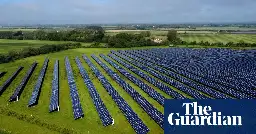
> The government will need to “take on net-zero nimbys” and ramp up public investment to decarbonise Britain’s homes, transport and electricity system, a leading thinktank has said. > >With Keir Starmer promising a rapid transition to decarbonise the power system by 2030, a report by the Resolution Foundation said achieving the target would require more government spending and private investment. > > However, the thinktank said projects required to meet the goal – including new solar farms, battery storage, and onshore wind turbines – were likely to face resistance from local groups. It said many renewables projects would take place in wealthier parts of the country, and two-thirds of proposed solar projects would be in the richest 40% of neighbourhoods. > >“Doing this effectively will require overcoming opposition to development from net-zero nimbys, who often live in wealthier parts of the country,” said Jonny Marshall, a senior economist at the Resolution Foundation. > >“The government must be prepared to win these battles, which won’t be popular with some voters but are vital for the country as a whole.” > >The thinktank said options for dealing with the friction could include taking responsibility out of local hands to unblock development, or providing financial incentives to smooth opposition. Alternatively, allowing local opposition could “stymie decarbonisation”. > > Starmer’s government is already taking steps by lifting a de facto ban on new onshore wind turbines in England, relaxing planning laws, and dropping the legal defence of a proposed new coalmine. Ed Miliband, the energy secretary, last week drew criticism from Conservative MPs over the green-lighting of a new £600m energy farm in their constituencies on the Cambridgeshire/Suffolk border. > > ... > > A Department for Energy Security and Net Zero spokesperson said the government was “wasting no time” in taking action on green energy. > >“In just one week, we have swept away barriers to onshore wind farms, consented more solar power than has been installed in the past year and set out plans for a solar rooftop revolution. > >“It is also important we listen to people’s concerns, and where communities host clean energy infrastructure they should benefit directly from it.”
- Newly approved solar farms will be UK's biggest, crushing Nimby oppositioninews.co.uk Newly approved solar farms will be UK's biggest, crushing Nimby opposition
The government has even gone against the recommendation of its own planning inspectorate in one of the new solar farm projects

> The Government has ignored the recommendations of its own planning inspectorate and widespread opposition from locals to drive through the UK’s biggest solar farm projects so far. > >Just days into his tenure as Energy Secretary, Ed Miliband gave the green light to the UK’s two biggest solar farms, declaring that “solar power is crucial to achieving net zero”. > >“Some of these cases had been held up for months before I arrived in the department. They were put on my desk on Monday and I’ve made a decision in three days,” he said. > > The new projects, which would power 400,000 homes in total, have been taken as the clearest sign yet that the government intends to drive through dozens of solar and onshore wind farms in the next few years, in many cases against stiff opposition from locals. > >The biggest of the new solar farms, near the village of Gate Burton in Lincolnshire, would be the largest in the UK by some way – producing eight times as much electricity as the biggest one currently in operation, which is in Llanwern, Wales.
- Labour’s ‘rooftop revolution’ to deliver solar power to millions of UK homeswww.theguardian.com Labour’s ‘rooftop revolution’ to deliver solar power to millions of UK homes
Ed Miliband sets new rules on solar panels and approves three giant solar farms as Labour seeks to end years of Tory inaction
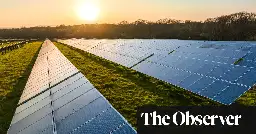
> Keir Starmer’s Labour government unveils plans for a “rooftop revolution” today that will see millions more homes fitted with solar panels in order to bring down domestic energy bills and tackle the climate crisis. > >The energy secretary, Ed Miliband, also took the hugely controversial decision this weekend to approve three massive solar farms in the east of England that had been blocked by Tory ministers. > > The three sites alone – Gate Burton in Lincolnshire, Sunnica’s energy farm on the Suffolk-Cambridgeshire border and Mallard Pass on the border between Lincolnshire and Rutland – will deliver about two-thirds of the solar energy installed on rooftops and on the ground in the whole of last year. > > Now, before Wednesday’s king’s speech, which will include legislation for setting up the new publicly owned energy company GB Energy, ministers are working with the building industry to make it easier to buy new homes with panels installed, or instal them on existing ones. > >Ministers are looking at bringing in solar-related standards for new-build properties from next year. > >At present, while formal planning permission is not required, there are restrictions on where and how high up on buildings they can be placed. There are also restrictions in conservation areas and on listed buildings. These may also be re-examined.
- Ed Miliband orders immediate ban on new drilling in North Seawww.thenational.scot Ed Miliband orders immediate ban on new drilling in North Sea
ED Miliband has ordered an immediate ban on new drilling in the North Sea, overruling his own officials.
> In an unusual move, the Energy Secretary – a committed opponent of oil and gas – has told regulators not to approve a new round of drilling that was slated for confirmation in the coming weeks. > >It means companies have potentially wasted millions on preparing their bids, with experts warning legal action is likely. > >The decision follows crisis meetings held this week between Miliband and his aides after questions were asked by journalists about outstanding drilling applications. > > Applications were submitted by 76 oil and gas companies as part of the 33rd offshore oil and gas licensing round initiated by the last government in autumn 2023. > >Bids for up to 35 areas of the North Sea were still awaiting a decision from the North Sea Transition Authority (NSTA) when the election was called. > > In a statement late on Wednesday, Miliband's spokesman said: “We will not issue new licences to explore new fields, and will not revoke existing oil and gas licences. We will manage existing fields for the entirety of their lifespan.”
- Climate expert Chris Stark appointed to lead UK clean energy taskforcewww.theguardian.com Climate expert Chris Stark appointed to lead UK clean energy taskforce
‘Mission control centre’ to work with energy companies and regulators towards goal of clean and cheaper power by 2030

> Labour has appointed one of the country’s foremost climate experts to lead a “mission control centre” on clean energy. > >Chris Stark, the former head of the UK’s climate watchdog, will head a Covid vaccine-style taskforce aimed at delivering clean and cheaper power by 2030. > >The Department for Energy Security and Net Zero said the centre would work with energy companies and regulators and would be the first of its kind in Whitehall, following Keir Starmer’s plan for mission-driven government. > > According to this model, ministers will focus on tackling five of the biggest challenges facing the country, one of which is clean energy. > >Stark said: “Tackling the climate crisis and accelerating the transition to clean power is the country’s biggest challenge, and its greatest opportunity. By taking action now, we can put the UK at the forefront of the global race to net zero.”
- Will my heat pump be a noise nuisance to my neighbours?www.theguardian.com Will my heat pump be a noise nuisance to my neighbours?
Newer models are quieter than older ones, and barking dogs are a far bigger cause of complaints

>Heat pumps are designed to be installed outside the home to extract warmth from the air, ground or water. In densely populated areas, this could mean scores of heat pump fans humming within a small area. > >One device typically emits a constant hum of between 40 and 60 decibels – about the same as a fridge or dishwasher – but could millions of heat pumps amount to a noise nuisance? > > The claim > > Concerns about heat pump noise began to take hold in the British press late last year after the Conservative government commissioned an independent review into noise emissions from air source heat pumps. > > Research submitted included a report by three experts presented at the Institute of Acoustics conference last October. It was seized on by the Daily Telegraph, which reported that it had found heat pumps were “too noisy for millions of homes in the UK”. > >The report contained a claim that heat pumps installed in flats or terraced houses would break the noise limits set by the Microgeneration Certification Scheme (MCS), an accreditation body, which stipulate that a heat pump should be no louder than 42 decibels within one metre of a neighbour’s door or window. > >The Daily Mail and Daily Express repeated the story a day later. Concerns about the issue appeared in the Guardian, too, with one reader’s letter complaining that a summer stay in a development where all eight properties had heat pumps was marred by the devices. “If you sat in the garden in the evening, it was an annoying, continual source of noise,” the writer said. > > ... > > The verdict > >Heat pumps are quieter than they used to be, and getting quieter still. But better consumer information could go further in mitigating the overall impact of noise by choosing the best model for the home and using it correctly. > > “I believe that many people in the UK try to operate their heat pumps the way they operate gas boilers – turning them on and off – but they can’t heat houses as quickly as gas boilers, so they need to run constantly to do that,” said Harvie-Clark. > >Turning heat pumps on after a period of being off will require the machine to work harder and therefore create more noise. So taking a slow and steady approach to home heating can make heat pumps more efficient, and quieter, too. > >“In colder European countries they accept that this is how to run heating systems. Our temperate climate means people have different control expectations,” Harvie-Clark said. > >“While the potential noise impact of air source heat pumps should be considered, it is important to balance this with the significant environmental benefits of transitioning away from fossil fuel heating systems. Gas boilers also make a noise.”
- England's largest onshore wind farm in Yorkshire 'would be catastrophic for nature'
> Campaigners have warned that building England’s largest onshore wind farm on protected peatland would be “catastrophic for carbon storage, wildlife and flood risk”. Saudi-backed developer World Wide Renewable Energy Global Ltd wants to construct the farm on more than 2,300 hectares at Walshaw Moor, between Hebden Bridge and Haworth. > > Consisting of up to 65 wind turbines, it would be capable of generating up to 302MW of energy. > > The developer said last September that it would establish a £75m community benefit fund and also pledged to end grouse shooting if it was granted planning permission. > > However, campaigners say it would impact endangered birds, like curlew, lapwing, skylark and merlin, and exacerbate already serious local flooding. > > The huge development would need 22 miles of access roads and 160 tonnes of reinforced concrete for each of the gigantic turbines. > > At 200m tall (655ft), the turbines would be 20m higher than London’s 41-storey Gherkin building. > > Campaigners say turbine construction and the associated infrastructure will affect hydrology, causing peatlands to dry out to such an extent that they will become a net emitter of carbon rather than a carbon sink.
- The end of coal power is 5 months away (2021 press release linked)www.gov.uk End to coal power brought forward to October 2024
The deadline to phase out coal from Great Britain's energy system has been brought forward by a whole year, highlighting the UK’s leadership to go further in driving down emissions and tackling climate change.
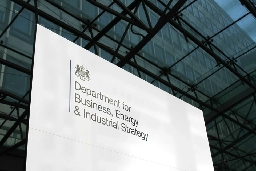
- Green light for huge green energy park in Yorkshire - with 4,500 jobs on cardswww.hulldailymail.co.uk Green light for huge energy park - with 4,500 jobs on cards
Project 'will help cement Hull’s status as a leader in renewable energy', council says

> Plans for a £200m green energy park, which could create 4,500 jobs, have been given the green light.
> Yorkshire Energy Park, on the site of the former Hedon Aerodrome, to the east of Hull, is set to focus on renewable energy, battery storage, state-of-the-art digital infrastructure and research and development. The proposal, for land allocated to the wider Humber Freeport scheme, was approved by Hull City Council's ruling cabinet.
- Households set to learn of fresh energy price risewww.independent.co.uk Households set to learn of fresh energy price rise
Ofgem will announce its latest price cap on Thursday.

> Households are set to learn that their energy bills will rise again from January as hopes for relief from the cost-of-living crisis are put on hold. > > Ofgem will announce its latest price cap on Thursday, with energy consultancy Cornwall Insight predicting it will increase from the current £1,834 for a typical dual fuel household to £1,931 – a 5% jump to take effect from January to March. > > The forecasts suggest that the typical bill will then fall to £1,853 from the start of April, but will not drop below today’s level until July next year. > > ... > > Dr Craig Lowrey, principal consultant at Cornwall Insight, said: “An unstable wholesale energy market, coupled with the UK’s reliance on energy imports, makes it inevitable that energy bills will rise from current levels. > > “This leaves households facing yet another winter with bills hundreds of pounds higher than pre-pandemic levels, and affordable fixed deals few and far between.” > > ... > > “While we continue to advocate for immediate targeted support for vulnerable consumers, it is evident that the only enduring solution lies in transitioning the UK away from the influence of global energy prices towards sustainable, domestically sourced energy.”
- Allowing Cumbria coalmine was ‘disaster’ for climate diplomacy, says Lord Turnerwww.theguardian.com Allowing Cumbria coalmine was ‘disaster’ for climate diplomacy, says Lord Turner
Former chair of climate change committee says UK’s decision has encouraged other countries to keep exploiting fossil fuels

> Other countries are using the UK as an excuse for pressing ahead with fossil fuel projects despite their climate commitments, according to Adair Turner, the first chair of the Committee on Climate Change and a former head of the CBI. > > Lord Turner told the Guardian that he had “literally been involved in discussions” in China and India where UK decisions had been given as a reason for not moving faster on the climate. > > “I can tell you that [the Cumbrian coalmine] was a disaster globally, and in China and India, where I was engaged in debates [on reducing greenhouse gas emissions], I have had people say ‘yeah, but you’re building a new coalmine in the UK’,” he said. > > “So that was a disaster for our reputation, and it provides arguments for the people within government or within interest groups in China and India to say ‘oh look, the UK is supposedly committed to net zero, but it’s not serious, it’s building a new coalmine’. And the same occurs with new oil and gas fields in the North Sea.” > > Turner is now chair of the Energy Transitions Commission (ETC), a thinktank that on Thursday published a report that says the production of and demand for fossil fuels must be reduced rapidly, and that this is achievable. “Unabated” fossil fuel use must be phased out, and there is only limited scope for the use of carbon capture and storage (CCS), the report finds.
- Floating factories of artificial leaves could make green fuel for jets and shipswww.theguardian.com Floating factories of artificial leaves could make green fuel for jets and ships
Cambridge University scientists develop a device to ‘defossilise’ the economy using sunlight, water and carbon dioxide

> Automated floating factories that manufacture green versions of petrol or diesel could soon be in operation thanks to pioneering work at the University of Cambridge. The revolutionary system would produce a net-zero fuel that would burn without creating fossil-derived emissions of carbon dioxide, say researchers. > > The Cambridge project is based on a floating artificial leaf which has been developed at the university and which can turn sunlight, water and carbon dioxide into synthetic fuel. The group believe these thin, flexible devices could one day be exploited on a industrial scale. > > “Solar panels are excellent at generating electricity and are making a great contribution to the world reaching its net zero aspirations,” said Erwin Reisner, the professor of energy and sustainability at Cambridge University. “But using sunlight to make non-fossil fuels that could be burned by cars or ships takes things a stage further.” > > Reisner and his colleagues envisage exploiting the technology to build carpets of artificial leaves that would float on lakes and river estuaries, and use sunlight to convert water and carbon dioxide into the components of petrol and other fuels. “The crucial point is that we are not decarbonising the economy through techniques like these,” Reisner said. “Carbon is still a key component. What we are doing is to ‘defossilise’ the economy. We will no longer be burning ancient sources of carbon – coal, oil and gas – and adding greenhouse gases to the atmosphere, a process that is doing so much damage at present.”
- Can solar and wind power Britain? An update of David MacKay's numberswww.sustainabilitybynumbers.com Can solar and wind power Britain? An update of David MacKay’s numbers
These technologies have developed a lot since 2008. Should we be any more optimistic about their potential to power Britain?
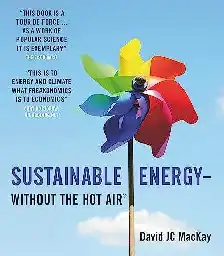
cross-posted from: https://derp.foo/post/374476
Wind conclusions:
> The authors give three reasons for their discrepancy with MacKay’s estimates. > > * Improved fixed turbine technologies. MacKay described all waters deeper than 30 metres as “not economically feasible”. But fixed turbines could soon be commercially feasible to around 80 metres of depth. > > * Floating offshore turbines. The advent of floating turbines means that these can extend into much deeper waters. Note that O’Callaghan et al. (2023) already account for many other competing uses such as fishing areas, military zones, shipping routes, and low-wind areas. > > * Improved social and political support. O’Callaghan et al. (2023) assume there is less public resistance to offshore wind, which seems appropriate.
Solar conclusions:
> What are the major differences to MacKay? > > * Lower cost: the price of solar PV has fallen by 90% in the last decade. MacKay’s main concern was it was too expensive: this is not the case today. > > * Improved cell efficiency: MacKay used a cell efficiency of 10%, and thought an efficiency of 30% would be “quite remarkable”. Last year, Fraunhofer ISE achieved 47.6%. Efficiencies greater than 30% have also been achieved using perovskite solar cells. O’Callaghan uses a cell efficiency of 25%. See the footnote for a chart showing the differences in efficiency over time.7 > > * Combined use with agriculture: MacKay assumed an inherent trade-off between agricultural land and solar. He thought the Brits would never give up farmland for solar panels. But this trade-off does not always exist: there are now a range of projects where solar and agriculture work in tandem (‘agrivoltaics’).
- Dearman – making clean engines with liquid airwww.theguardian.com Dearman – making clean engines with liquid air
British startup pioneering a piston engine that could revolutionise refrigerated transport and power zero emissions vehicles

- Labour can hit green goals by building in Tory seats, Keir Starmer toldwww.politico.eu Labour can hit green goals by building in Tory seats, Keir Starmer told
Analysis shared with POLITICO suggests a Labour government could swerve NIMBY backlash as it races to decarbonize Britain’s electricity grid.

- Proposed North Yorkshire fracking site becomes source of clean, geothermal energynews.sky.com Proposed North Yorkshire fracking site becomes source of clean, geothermal energy
An underground well in the North Yorkshire village of Kirby Misperton was drilled but never fracked after a fightback by protesters. It has now taken on a "second life" as a source of clean, green, geothermal energy.

> The well was drilled but never fracked - leaving the site owners, Third Energy, with a deep hole in the ground. > > Tom Heap with Steve Mason and Russell Hoare at the once highly-contested proposed fracking site Its managing director, Russell Hoare, showed me the well and explained its second life. They are even re-using the two metre-high gas valve which caps the hole. > > "This is the actual well that was drilled for fracking and it's about 3,000 metres deep, but the protesters were successful, and Steve was successful, in stopping that operation. > > "But it's perfect for testing geothermal energy. There's hot water at the bottom. All we're doing is bringing it to the surface." > > ... > > Once commercially exploited, they reckon this well could supply 300 homes, so we would need a lot more deep drilling to keep Britain warm. > > Gas to geothermal conversion company, CeraPhi, thinks there are 680 wells in the UK ripe for conversion together with millions around the world, and that new wells can be sunk cheaply enough to expand further. > > Such potential provokes interest. While we are on the site, chief executive Karl Farrow is showing around a group of academics and industry players. > > They've had more than 100 such visitors in the past month. > > Karl told me: "Wells at the end of life can be repurposed and reused for energy.
- Say YES to renewables. Join thousands in Generation YES to make changerippleenergy.com Join thousands in Generation YES to make change
Make your voice heard for real climate action

- Plans unveiled for new solar farm and battery storage scheme on edge of Bedfordwww.bedfordtoday.co.uk Plans unveiled for new solar farm and battery storage scheme on edge of Bedford
And you can have your say via public consultation starting today
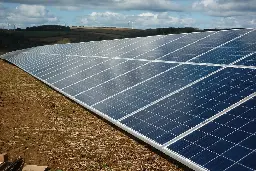
cross-posted from: https://feddit.uk/post/3446966
> And you can have your say via public consultation starting today
- These flooded coal mines are being used to heat hundreds of homeswww.euronews.com These flooded coal mines are being used to heat hundreds of homes
Abandoned coal mines are providing a surprisingly potent source of zero-carbon energy in Europe.
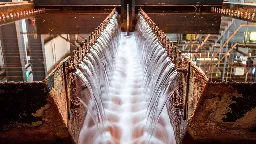
> An old coal mine has been providing an English town with green energy for the last six months. > > The ground-breaking project in Gateshead is using the warm water that has filled the tunnels to heat hundreds of homes and businesses in the former coalfield community. > > Hailed a success, the UK’s first large-scale network shows the huge potential to be found in the nation’s sprawling warren of old mining tunnels, which sit beneath roughly a quarter of homes.
- Largest offshore wind farm celebrates power milestonewww.bbc.co.uk Largest offshore wind farm celebrates power milestone
Power from the first turbine at the Dogger Bank scheme is now being sent to the UK's national grid.

> The world's largest offshore wind farm has started producing electricity for the first time. > > Power from the first turbine at the Dogger Bank project, which is construction in the North Sea, is now being sent to the UK's national grid. > > In total 277 turbines will be powered-up at the location, situated between 81 and 124 miles (130-200km) off the Yorkshire coast. > > The wind farm is due for completion in 2026. > > ... > > Each rotation of the 107m (351ft) long blades on Dogger Bank's first operational turbine can produce enough clean energy to power an average British home for two days, SSE Renewables said. > > Once complete, Dogger Bank's offshore turbines are expected to generate 3.6GW of power - enough for six million UK homes.
- ‘Detached from reality’: anger as Rishi Sunak plans to restrict solar panelswww.theguardian.com ‘Detached from reality’: anger as Rishi Sunak plans to restrict solar panels
Climate campaigners dismiss government argument that move will improve food security
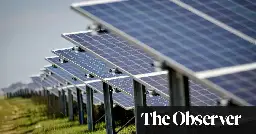
> Rishi Sunak plans to restrict the installation of solar panels on swathes of English farmland, which climate campaigners say will raise bills and put the UK’s energy security at risk. > > Last year, then prime minister Liz Truss attempted to block solar from most of the country’s farmland. The plans were deeply controversial and unpopular, and were dropped when she left office. > > However, solar panels in the countryside are disliked by many rural Conservative MPs, and the Observer can reveal that Sunak and environment secretary Thérèse Coffey have revived plans to put new restrictions on this form of cheap renewable energy.
- 'Peer-to-peer energy trading slashes business bills by up to 90%'www.energylivenews.com 'Peer-to-peer energy trading slashes business bills by up to 90%' - Energy Live News
Companies at Mildenhall Industrial Park in West Suffolk have witnessed reductions in their energy bills, ranging from 20% to 90%, through peer-to-peer energy trading

> Small and medium-sized enterprises (SMEs) at Mildenhall Industrial Park in West Suffolk have reported reductions in their energy bills, ranging from 20% to as much as 90%, thanks to a peer-to-peer energy trading initiative. > > West Suffolk Council and Manchester-based deeptech company UrbanChain have partnered to establish a local green energy market. > > Peer-to-peer energy trading enables individuals and businesses to directly buy and sell electricity. > > West Suffolk Council has proactively invested in renewable energy infrastructure, with 272kW of solar PV installations on ten commercial buildings within Mildenhall Industrial Estate and ownership of a nearby 12MW solar farm. > > By participating in UrbanChain’s peer-to-peer energy exchange, the council’s renewable generators have seen returns at least 35% higher than prevailing market rates.
- UK electricity consumption hits rock bottomwww.energylivenews.com UK electricity consumption hits rock bottom - Energy Live News
Electricity consumption in the UK has reached its lowest level since the second quarter of 2020, primarily driven by reduced demand in all sectors, especially in the domestic sector

> The consumption of electricity in the UK has reached its lowest levels since the second quarter of 2020, a period marked by the initial Covid-19 lockdown, which significantly curtailed energy demand. > > According to government analysis, this decline in electricity consumption is evident across all sectors, with the domestic sector experiencing the most significant reduction, down by 7.7% to 20.4TWh. > > This continued trend of decreased consumption aligns with the backdrop of increasing household expenses, including rising energy costs. > > In addition, there has been a substantial decrease in the demand for natural gas, with a 13% during the second quarter of 2023 compared to the same period in 2022. > > The total final consumption of gas also witnessed a decline of 7.5%, reflecting reduced gas demand across all sectors. > > Among these sectors, the domestic sector saw the most substantial decline, down by 9.3% compared to the same period in the previous year.
- Designs chosen for mini nuclear reactorswww.constructionenquirer.com Designs chosen for mini nuclear reactors
First contracts for next generation of nuclear power to be awarded next summer

cross-posted from: https://lemmy.ml/post/5912949
> EDF, GE-Hitachi Nuclear Energy International LLC, Holtec Britain Limited, NuScale Power, Rolls Royce and Westinghouse Electric Company UK Limited have been chosen for the next stage of the process. > > The Small Modular Reactor (SMR) competition is part of the government’s plan for up to a quarter of all UK electricity to come from nuclear power by 2050.
- UK's Onshore Wind Sector Experiences Strong Growth, Reaching 14GW Mark
cross-posted from: https://lemmy.ml/post/5913604
> >To date, the UK has installed more than 14 GW of onshore wind power and has a pipeline of planned projects totaling 23 GW. > > Cool to see the UK doing cool shit even though they left the EU.
- Why Scotland's renewable energy schemes are being delayed for yearswww.scotsman.com Why Scotland's renewable energy schemes are being delayed for years – Dr Sam Gardner
The last big electricity transmission line built in Scotland took 15 years to get through permitting and construction
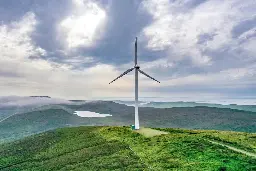
> if we’re to stand any chance of making that net-zero deadline, we need to be able to do all of this faster. Quite simply, green energy projects are taking far too long to clear the planning process. It takes two years to build an offshore wind farm, but ten years to get it from the drawing board and through planning; and half that for onshore. > > The last big electricity transmission line built in Scotland, Beauly-Denny, took 15 years to get through permitting and construction. By those standards, we would reach 2045 before we know it, with nothing changed. The recent Onshore Wind Sector Deal signed between the Scottish Government and the industry sets out commitments to reduce planning determination timescales, which is very welcome. > > What we now need from both the Scottish and UK governments is a commitment to speed up the planning process to one year for all new renewables as well as the grid infrastructure that connects them to the network. It’s no good building the low-carbon generation if you can’t move the power to where it’s needed. > > ... > > Dr Sam Gardner is ScottishPower’s head of climate change and sustainability
So add salt accordingly. However, it does look like the Tories are building themselves up to be the party of NIMBYs and climate change deniers.
